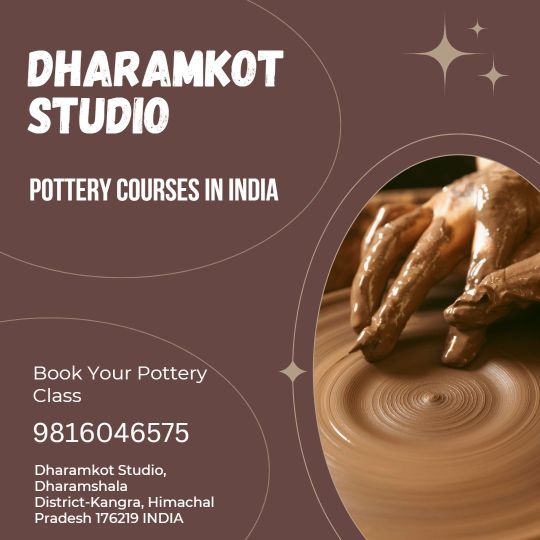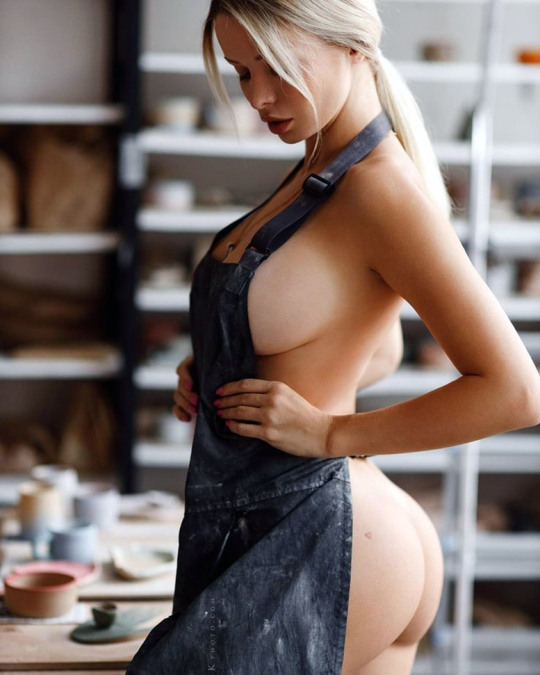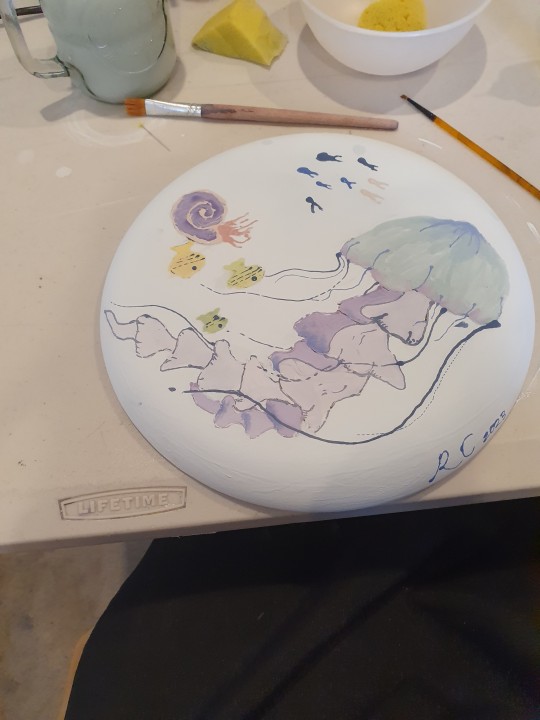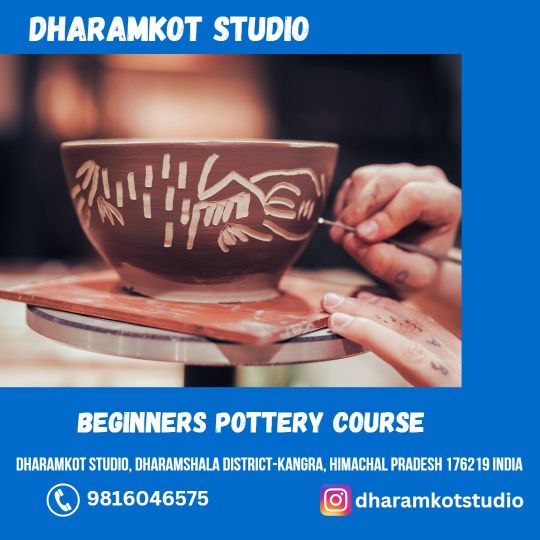#Pottery workshop
Text

4 notes
·
View notes
Text
Pottery Passion: A Journey Through Unique and Specialised Programs
Pottery, an ancient art form dating back thousands of years, continues to captivate individuals with its tactile nature and endless creative possibilities. In today’s world, pottery programs serve as gateways to this timeless craft, offering enthusiasts opportunities to explore various techniques and develop their skills. In this article, we’ll embark on a journey through unique and specialised pottery programs, delving into the significance of specialization and exploring the offerings of Firebird Studios, the best pottery workshop and pottery classes in QLD, Australia.
Understanding Pottery Programs
Pottery programs encompass a range of instructional experiences designed to teach individuals the art and craft of pottery making. From introductory Pottery workshops to advanced pottery courses, these programs cater to participants of all skill levels and interests. Specialization within pottery programs is crucial, as it allows participants to focus on specific techniques and styles, leading to deeper understanding and mastery.
The Significance of Specialized Pottery Programs
Specialized pottery programs offer participants a tailored learning experience focused on specific aspects of pottery making. Whether it’s wheel-throwing, hand-building, or glazing, these programs provide in-depth instruction and practice opportunities to develop proficiency in particular areas. By honing their skills through specialized programs, participants can unleash their creativity and innovation, leading to the creation of unique and exceptional pottery pieces.
Exploring Unique Pottery Programs
Wheel-Throwing Workshops Wheel-throwing workshops introduce participants to the art of creating pottery on a potter’s wheel. From basic techniques like centering and opening to advanced methods such as trimming and altering, these workshops cover the fundamentals of wheel-throwing, providing participants with the skills needed to create functional and aesthetic pieces.
Introduction to Wheel-Throwing: Beginners learn the basic steps of wheel-throwing, including centering clay on the wheel, opening the clay to form a cylinder, and pulling walls to create height and shape.
Advanced Wheel-Throwing Techniques: Experienced potters explore advanced wheel-throwing techniques, such as throwing larger forms, creating complex shapes, and incorporating decorative elements into their designs.
Hand-Building Classes Hand-building classes focus on creating pottery without the use of a potter’s wheel, allowing participants to sculpt and shape clay by hand. From pinch pots and coiling to slab construction and sculptural techniques, hand-building classes offer a diverse range of methods for creating unique and expressive pottery pieces.
Techniques and Methods: Participants learn various hand-building techniques, including pinch, coil, and slab construction, as well as sculptural methods like carving, modeling, and assembling.
Sculptural Hand-Building: Advanced hand-building classes delve into sculptural techniques, encouraging participants to explore form, texture, and surface treatment to create one-of-a-kind sculptural pieces.
Glazing Workshops Glazing workshops focus on the art of applying glazes to pottery surfaces, transforming raw clay pieces into finished works of art. Participants learn about different types of glazes, application techniques, and firing processes, gaining the skills needed to enhance the aesthetic appeal of their pottery creations.
Understanding Glazes: Participants gain an understanding of glaze chemistry, including the composition of glazes, the interaction of glaze materials, and the effects of temperature and atmosphere on glaze development.
Experimentation and Creativity: Glazing workshops encourage participants to experiment with different glaze recipes, application methods, and surface decoration techniques, fostering creativity and innovation in glaze design.
Benefits of Enrolling in Specialised Pottery Programs
Enrolling in specialised pottery programs offers numerous benefits for participants, including:
Skill Enhancement: Specialised programs allow participants to focus on specific techniques and areas of interest, leading to skill development and mastery.
Creative Expression: By exploring different pottery techniques and styles, participants can express their creativity and individuality through their pottery creations.
Personal Satisfaction and Fulfillment: The process of creating pottery can be deeply rewarding, providing a sense of accomplishment and fulfillment as participants see their ideas take shape in clay.
Firebird Studios: The Best Pottery Workshop and Classes in QLD, Australia
Nestled in the heart of QLD, Australia, Firebird Studios stands out as the premier destination for pottery enthusiasts seeking high-quality instruction and inspiration. With a diverse range of pottery programs, state-of-the-art facilities, and experienced instructors, Firebird Studios offers participants a unique and enriching pottery experience.
Conclusion
In conclusion, pottery passion is a journey of exploration and discovery, fueled by the desire to create and innovate. By enrolling in specialised pottery programs, participants can deepen their understanding of the craft, develop their skills, and unleash their creativity. Whether you’re a beginner looking to learn the basics or an experienced potter seeking to refine your techniques, there’s a pottery program for you. So why wait? Embark on your pottery journey today and join us at Firebird Studios, where every masterpiece begins with a lump of clay and a spark of inspiration.
0 notes
Text
Maximizing Your Relaxation In Pottery Making Workshop
Pottery making is a great way to relax and de-stress, and it can also be a very creative outlet. To get most of your pottery making workshop you should wear comfortable clothing and shoes, bring a water bottle, take breaks, and don't be afraid to make mistakes.

0 notes
Text
Jumpstart Your Creativity: Strategies for Taking Effective Creative Breaks
Taking creative breaks in mountains is an excellent way to rejuvenate your mind and body, draw inspiration from nature, and find innovative solutions to real-life problems. But to make the most of your creative adventure and come back fresh and energized, you need to plan and execute your breaks strategically. Here are some strategies for taking effective creative breaks in mountains at Dharamkot Studio Dharamshala that will help you maximize your creativity, relaxation, and enjoyment.
Firstly, plan your trip in advance and choose the right time, location, and duration based on your preferences, goals, and physical fitness. Mountains offer a range of activities such as hiking, camping, skiing, and exploring, so identify what interests you and what you want to achieve during your break. Decide if you want to go solo or with a group, and if you need to hire a guide or rent equipment. Consider the weather, accommodation, and transportation options and make reservations accordingly. A well-planned trip ensures that you have everything you need to make the most of your time in the mountains.
Secondly, disconnect from technology and the outside world as much as possible during your break. Turn off your phone, emails, and social media notifications, and focus on the present moment and your surroundings. Unplugging from the digital world not only reduces stress and anxiety but also allows you to connect with nature, appreciate beauty, and boost your imagination. Bring a journal, sketchpad, or camera to record your thoughts, impressions, and observations, and use them as prompts to brainstorm ideas and create something new. A digital detox can help you declutter your mind and recharge your creative batteries.
Thirdly, engage in physical activities that challenge you and provide pleasure without exhausting you. Mountains offer plenty of opportunities to hike, bike, swim, climb, and ski, and each activity exposes you to different terrains, landscapes, and weather conditions. Choose an activity that suits your fitness level and interests, but also pushes you out of your comfort zone and encourages you to be present and mindful. Exercise releases endorphins, reduces tension, and clears your head, so it can help you unleash your creativity and solve problems with ease.
Fourthly, nourish your body and soul with healthy, local, and seasonal foods that provide energy, nutrients, and pleasure without overindulging. Mountain cuisine often features fresh dairy products, meats, grains, and berries, as well as herbal drinks, teas, and soups that reflect the local culture and traditions. Sample the regional specialties, but also try to incorporate fresh fruits, vegetables, and water into your diet to stay hydrated and prevent fatigue. Eating mindfully and savoring the flavors, aromas, and textures of food can enhance your sensory experience and fuel your creativity.

#creative retreat#art retreat#pottery retreat#pottery workshop#art retreat dharamshala#creative place in dharamshala
0 notes
Text
Why Should Every New Potter Take A Pottery Class?
When you attend a pottery workshop or class, you get to connect with other potters. This is very helpful as you get the opportunity to exchange pottery-making ideas and tips learned along the way. People help and encourage each other, making pottery learning fun. It feels great to find a piece and show everyone as well as see what others have created.
To know more:
0 notes
Text

Ekaterina Enokaeva (Katya Enokaeva , Екатерина Енокаева)
79 notes
·
View notes
Text




This afternoon I was invited to help a group of Girl Scout Brownies and Daisies achieve their Art and Design badge! I had so much fun teaching them how to make pinch pots and coil pots, explore what it means to make art and how it can solve problems, and then to just have fun making little fun things!
#arting#pottery#i am now going to go home and not speak for the rest of the day#that was a lot more draining to teach than my adult workshops lmao
31 notes
·
View notes
Text

Medieval Pottery Workshop — With Pieces Still in the Oven — Found in France
A collection of pots sat in a brick oven in northern France, but these weren’t school art projects. These 400-year-old artifacts were buried several feet below the ground and forgotten — until now.
Archaeologists excavated a medieval site in Montreuil-sur-Mer known for its once-flourishing trade over the past year, the French National Institute for Preventive Archaeological Research said in a May 2 news release.
About six feet down, archaeologists uncovered a relatively intact brick oven — and found a forgotten medieval pottery workshop.
The workshop operated from the late 16th century into the early 17th century and primarily made sandstone products for cooking, officials said.

The 400-year-old workshop had two kilns, or ovens for firing pottery. The main furnace was shaped like an almond and made of bricks, archaeologists said. Inside were several almost complete pottery pieces and a variety of pottery waste.
Photos show the inside of the main furnace before and after being dismantled.

The second oven was smaller, older and likely unusable, archaeologists said. The kiln had no traces of heat damage. Instead, the medieval furnace was used as a dumping ground for pottery waste.

Traces of walls and buildings surrounded the medieval workshop, indicating it was likely an enclosed and covered space, officials said. The workshop was eventually abandoned, and other buildings were built on the site in the 17th and 18th centuries.
Archaeologists described the 400-year-old workshop as unprecedented because it is the only workshop of its kind in Montreuil-sur-Mer and the surrounding area.
Montreuil-sur-Mer, also known as Montreuil-on-the-Sea, is along the northern coast of France and a roughly 150-mile drive north from Paris.
By Aspen Pflughoeft.

#Medieval Pottery Workshop — With Pieces Still in the Oven — Found in France#Montreuil-sur-Mer#pottery#ceramic#ancient pottery#ancient artifacts#archeology#archeolgst#history#history news#ancient history#ancient culture#ancient civilizations#medieval
18 notes
·
View notes
Text
I spent so much time growing up and in my early twenties fantasising about being able to pursue my interests one day, because my mum couldn’t afford to pay for things and then I spent ages 20-26 being a student with no income. But now I can just do those things. I don’t have to daydream about learning an instrument, I can find a teacher and start lessons. I can buy clay to make things and go to pottery classes. I can sign up for workshops. I can buy the materials and have the spare time after work to learn how to use them. It’s what I’ve waited so long for and it’s scary! To finally be able to do those things, to admit to myself that I do want to do those things. Every time I go to do something I start to get overwhelmed by doubt and a sense of being an imposter because I’ve never been able to be someone who does things so it feels alien. I start to feel like “well I don’t actually need to do it I just like thinking about being someone who does that kind of thing”. So I am trying my best to set myself free from that idea because it just isn’t true.
#it’s like after going to that one pottery class it felt complete in my mind#like okay you had your fun go back to just thinking about it now#it sounds so silly lol and it is really. I could just go again and keep going and that would just be a hobby#I am going to sign up for the weaving workshop 🫡
19 notes
·
View notes
Text
yes, there may be better trios, but i will never say no to seeing these friends interact:
The Lost Hero Trio (Jason. Piper, Leo)
The Son of Neptune Trio (Percy, Hazel, Frank)
Pottery Barn Trio (Magnus, Alex, TJ)
#we need more TJ content#it would be so nice#TLH trio all hanging out in leo's workshop while he tinkers with something (Festus?)#TSN trio getting in and out at 3 am#Magnus and TJ making shit pottery while Alex laughes his/her head off#just some fic ideas :)#please credit me if you use it <3#rick riordan#magnus chase#magnus chase and the gods of asgard#percy jackson#alex fierro#thomas jefferson jr.#hazel levesque#jason grace#piper mclean#frank zhang#heroes of olympus#the lost hero#the son of neptune
32 notes
·
View notes
Text

Look at these lovely little pots! I did a pottery workshop recently with a friend of mine, and these are the pots I made, I just got them back this week. It was my first time using a pottery wheel, it was immense fun but also quite challenging.
I did the workshop with Little Dog Pottery in Hampshire, UK. They were great teachers, lovely people, and I got to cuddle their adorable little dogs. I recommend it! More pictures below.








8 notes
·
View notes
Text

Did a ceramic painting workshop gifted by a friend. It was so much fun! I barely finished by chip and dip/cake stand in the 3 hours, here's hoping it turns out as bright as intended.
42 notes
·
View notes
Text
Wheel-Thrown Wonders: Discovering Pottery Courses for Beginners
The Allure of Wheel-Thrown Pottery
Wheel-thrown pottery captivates with its blend of artistry and technique. Watching a lump of clay transform under skilled hands into a symmetrical vessel evokes a sense of magic and mastery. This ancient craft, dating back thousands of years, offers both a creative outlet and a meditative practice, making it an ideal hobby for beginners seeking to explore their artistic side while enjoying a calming activity.
Why Pottery is a Perfect Hobby for Beginners
Pottery, especially wheel-throwing, is a perfect entry point for those new to crafting. It requires minimal initial investment in terms of tools and materials, and the learning process is both engaging and rewarding. As you progress, you’ll experience a tangible sense of achievement with each completed piece, fueling your passion and creativity.
The Basics of Wheel-Throwing
Understanding the Pottery Wheel
The pottery wheel is the heart of wheel-throwing. This rotating disk, powered either by electricity or a foot pedal, allows potters to shape clay symmetrically. Understanding its mechanics and mastering its control are the first steps toward creating beautiful pottery.
Essential Tools and Materials
Aside from the wheel, several essential tools facilitate the pottery process. These include clay, a wire cutter, a sponge, wooden ribs, trimming tools, and a needle tool. Each tool plays a specific role, from cutting and shaping the clay to refining the final product.
Benefits of Learning Pottery
Creative Expression and Relaxation
Pottery is a form of creative expression that encourages experimentation with shapes, textures, and colors. The tactile nature of clay work also provides a soothing, almost therapeutic experience, allowing you to unwind and focus entirely on the creative process.
Developing Patience and Precision
Pottery teaches patience and precision. Centering the clay, perfecting your technique, and waiting for pieces to dry and fire all require a careful, measured approach. These qualities extend beyond the studio, enriching other aspects of life.
Choosing the Right Pottery Course
Factors to Consider
When selecting a pottery course, consider the instructor's experience, class size, and the studio's facilities. Look for courses that offer a balance of theoretical knowledge and hands-on practice, and ensure the environment is supportive and encouraging.
Importance of Expert Instruction
Expert instruction is crucial in pottery. An experienced teacher can provide personalized feedback, troubleshoot issues, and inspire confidence. At Firebird Studios, our instructors are dedicated to guiding you through every step of the wheel-throwing process, ensuring you build a solid foundation.
What to Expect in a Beginner's Pottery Class
Initial Learning Curve
The initial stages of learning pottery can be challenging. Expect to spend time mastering the basics, such as centering the clay and controlling the wheel's speed. With patience and practice, these fundamental skills will become second nature.
Hands-On Practice and Guidance
Beginner classes at Firebird Studios emphasize hands-on practice, with instructors offering continuous guidance. You’ll learn by doing, gradually refining your technique through repetition and expert feedback.
Techniques Taught in Beginner Courses
Centering the Clay
Centering the clay on the wheel is a foundational skill. It involves applying even pressure to ensure the clay spins symmetrically, setting the stage for further shaping.
Pulling Up the Walls
Once centered, you’ll learn to pull up the walls of the clay, shaping it into a cylinder. This technique is the basis for creating various forms, from bowls to vases.
Shaping and Trimming
Shaping involves refining the form and adding details, while trimming removes excess clay, creating a smooth, finished look. Both steps require precision and control, which you’ll develop over time.
The Role of Kilns in Pottery
Understanding the Firing Process
Firing transforms raw clay into durable, finished pottery. This process involves heating the clay in a kiln at high temperatures, causing physical and chemical changes that harden the material.
Types of Kilns and Their Uses
Different kilns serve various purposes. Electric kilns are common in studios for their ease of use and control, while gas kilns can produce unique effects in the glaze. Understanding the types of kilns helps in achieving desired results.
Decorating and Glazing
Basic Decorating Techniques
Decoration adds a personal touch to your pottery. Techniques like carving, stamping, and adding slip (liquid clay) can create intricate designs and textures, enhancing the visual appeal of your pieces.
Introduction to Glazing
Glazing involves applying a liquid layer to the pottery, which, when fired, forms a glassy surface. This not only adds color and shine but also makes the pottery waterproof. Beginners will learn basic glazing techniques to finish their pieces beautifully.
Common Challenges and How to Overcome Them
Centering the Clay
One of the most common challenges for beginners is centering the clay. It requires a delicate balance of pressure and speed. Practice and patience are key, as well as seeking advice from experienced potters.
Controlling the Wheel Speed
Wheel speed control is another hurdle. Too fast, and the clay can fly off-center; too slow, and it becomes difficult to shape. Mastering speed control will come with time and experience.
Showcasing Your Creations
Finalizing Your Pottery Pieces
Once your pieces are shaped and fired, the final step is to smooth any rough edges and apply the finishing touches. This finalization enhances the usability and aesthetic appeal of your pottery.
Displaying and Using Your Pottery
Displaying your creations is a source of pride. Whether using them as functional items or decorative pieces, your pottery will be a testament to your creativity and skill. Sharing them with friends and family can also be incredibly rewarding.
The Community Aspect of Pottery Classes
Building Connections with Fellow Potters
Pottery classes foster a sense of community. Sharing the studio with fellow enthusiasts allows for the exchange of ideas, techniques, and encouragement. These connections can enhance your learning experience and build lasting friendships.
Participating in Pottery Events and Exhibitions
Engaging in pottery events and exhibitions can further enrich your journey. These gatherings provide opportunities to showcase your work, learn from others, and gain inspiration from a wider community of artists.
Continuing Your Pottery Journey
Advancing to Intermediate and Advanced Techniques
As you become more confident in your skills, you can advance to intermediate and advanced techniques. These courses delve deeper into complex forms, glazing methods, and experimental processes, pushing the boundaries of your creativity.
Exploring Other Pottery Styles and Methods
Beyond wheel-throwing, there are numerous pottery styles and methods to explore. Hand-building, slip casting, and sculptural pottery are just a few avenues to consider, each offering its own unique challenges and rewards.
For those eager to embark on this enriching journey, Firebird Studios offers the best pottery workshops and classes in QLD, Australia. Visit Firebird Studios to learn more and begin your adventure in the captivating world of wheel-thrown pottery.
0 notes
Text
Me and my friend are going to a pottery workshop....so my blorbos will go to a pottery workshop
#leoneed going to a pottery workshop drabble 4k words we die like kagamine len#either that or a doodle (more likely)#zondesrambles
3 notes
·
View notes
Text
Discover Your Inner Creativity with the Best Art Workshops in Dharamshala
Dharamshala, a beautiful hill station in the Indian state of Himachal Pradesh, is not only known for its stunning natural beauty and vibrant Tibetan culture but also for its thriving art scene. Here are some of the best art workshops in Dharamshala for those looking to discover their inner creativity:
Dharamkot Pottery Studio & Art Retreat: Dharamkot Pottery Studio & Art Retreat offers an idyllic and peaceful getaway for art enthusiasts, especially those interested in pottery. Situated in the picturesque town of Dharamkot within the Himalayan foothills, this studio provides sculpting classes by professional artists that instruct beginners and experts alike. The retreat helps visitors to surround themselves with natural beauty while creating unique and fulfilling pieces of art. The tranquil atmosphere allows folks to disconnect from their daily routine entirely, making it a perfect environment to tap into your creative side fully. Moreover, the staff at Dharamkot Pottery Studio & Art Retreat are gracious and helpful hosts who make sure guests leave with unforgettable memories and fantastic creations as a reminder of their retreat experience.
Tushita Art School: Tushita Art School is a well-known art school in Dharamshala that offers courses in painting, drawing, sculpture, and printmaking. The school is run by professional artists who teach various techniques and styles of art.
Norbulingka Institute: The Norbulingka Institute is a cultural and educational center that offers workshops in traditional Tibetan art forms such as thangka painting, wood carving, and metal sculpture. The institute also offers courses in contemporary art forms such as photography, painting, and ceramics.
Kangra Arts Promotion Society: The Kangra Arts Promotion Society is a non-profit organization that aims to promote traditional art forms of the Kangra region. The society offers workshops in Kangra miniature paintings, pottery, and embroidery.
Himalayan Film School: The Himalayan Film School offers courses in filmmaking, animation, and graphic design. The school is run by professionals in the field and offers hands-on experience in all aspects of filmmaking.
Potala Tibetan Art School: The Potala Tibetan Art School offers courses in traditional Tibetan art forms such as thangka painting, sculpture, and embroidery. The school is run by professional Tibetan artists who teach the techniques and styles of these traditional art forms.
Dharamshala is a hub for art and creativity, and these workshops offer a great opportunity for visitors to explore their inner artist and learn new skills from professionals in the field.

0 notes
Text
Boost your Creative Mind with Pottery Workshop
A few specialised workshops are held throughout the year, concentrating on specific areas such as:
Throwing on the potter’s wheel ,glazing, hand building.
We offer a wide range of pottery techniques and creative skills; hand-building, throwing, glazing and designing. Our workshops and classes offer full support and guidance to enable you to unlock your creativity.
Contact us to join pottery workshop Call@ +971 2 666 7079
For more info visit:
0 notes